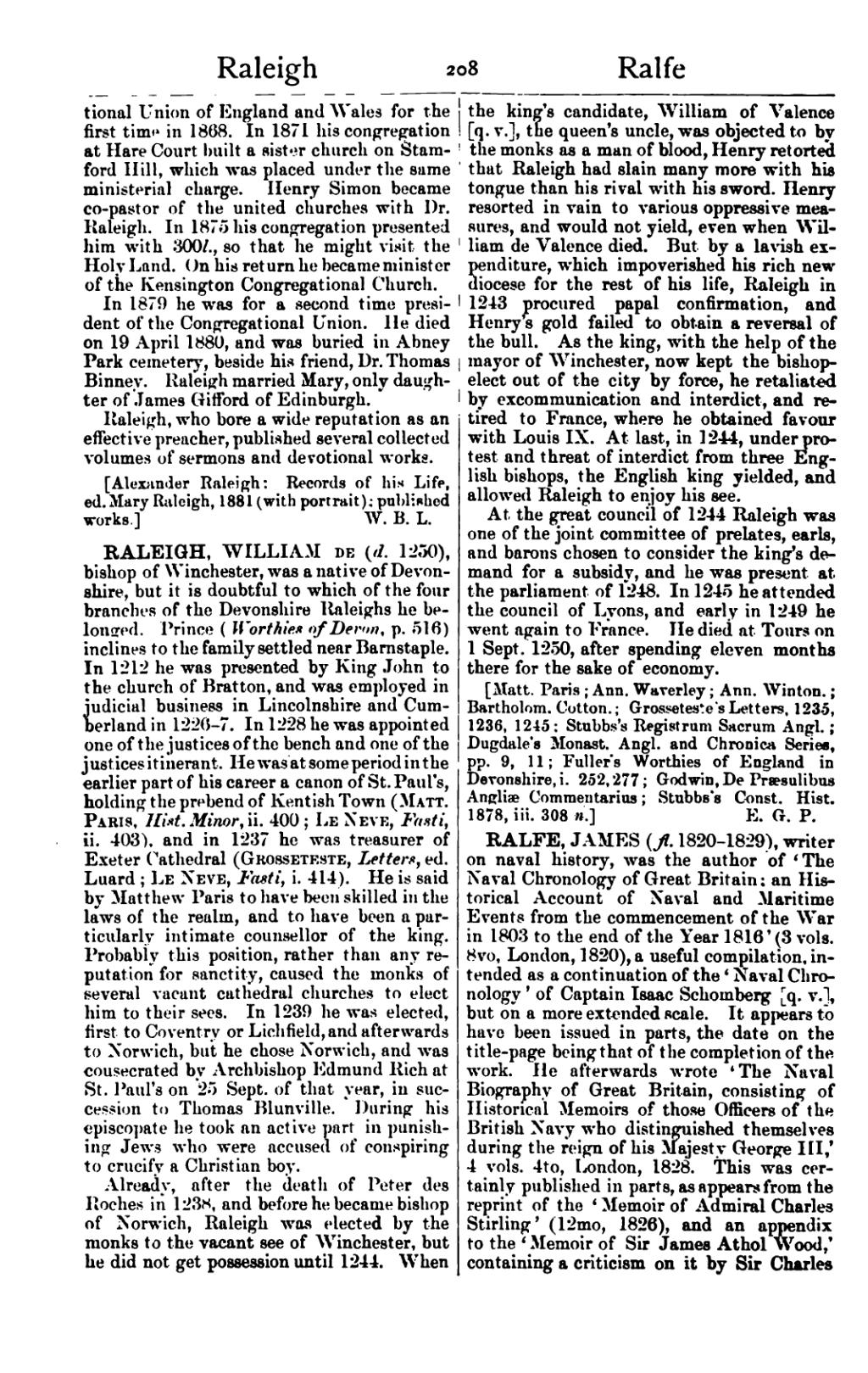tional Union of England and Wales for the first time in 1868. In 1871 his congregation at Hare Court built a sister church on Stamford Hill, which was placed under the same ministerial charge. Henry Simon became co-pastor of the united churches with Dr. Raleigh. In 1875 his congregation presented him with 300l., so that he might visit the Holy Land. On his return he became minister of the Kensington Congregational Church.
In 1879 he was for a second time president of the Congregational Union. He died on 19 April 1880, and was buried in Abney Park cemetery, beside his friend, Dr. Thomas Binney. Raleigh married Mary, only daughter of James Gifford of Edinburgh. Raleigh, who bore a wide reputation as an effective preacher, published several collected volumes of sermons and devotional works.
[Alexander Raleigh: Records of his Life, ed. Mary Raleigh, 1881 (with portrait); published works.]
RALEIGH, WILLIAM de (d. 1250), bishop of Winchester, was a native of Devonshire, but it is doubtful to which of the four branches of the Devonshire Raleighs he belonged. Prince (Worthies of Devon, p. 516) inclines to the family settled near Barnstaple. In 1212 he was presented by King John to the church of Bratton, and was employed in judicial business in Lincolnshire and Cumberland in 1226–7. In 1228 he was appointed one of the justices of the bench and one of the justices itinerant. He was at some period in the earlier part of his career a canon of St. Paul's, holding the prebend of Kentish Town (Matt. Paris, Hist. Minor, ii. 400; Le Neve, Fasti, ii. 403), and in 1237 he was treasurer of Exeter Cathedral (Grosseteste, Letters, ed. Luard; Le Neve, Fasti, i. 414). He is said by Matthew Paris to have been skilled in the laws of the realm, and to have been a particularly intimate counsellor of the king. Probably this position, rather than any reputation for sanctity, caused the monks of several vacant cathedral churches to elect him to their sees. In 1239 he was elected, first to Coventry or Lichfield, and afterwards to Norwich, but he chose Norwich, and was consecrated by Archbishop Edmund Rich at St. Paul's on 25 Sept. of that year, in succession to Thomas Blunville. During his episcopate he took an active part in punishing Jews who were accused of conspiring to crucify a Christian boy.
Already, after the death of Peter des Roches in 1238, and before he became bishop of Norwich, Raleigh was elected by the monks to the vacant see of Winchester, but he did not get possession until 1244. When the king's candidate, William of Valence [q. v.], the queen's uncle, was objected to by the monks as a man of blood, Henry retorted that Raleigh had slain many more with his tongue than his rival with his sword. Henry resorted in vain to various oppressive measures, and would not yield, even when William de Valence died. But by a lavish expenditure, which impoverished his rich new diocese for the rest of his life, Raleigh in 1243 procured papal confirmation, and Henry's gold failed to obtain a reversal of the bull. As the king, with the help of the mayor of Winchester, now kept the bishop elect out of the city by force, he retaliated by excommunication and interdict, and retired to France, where he obtained favour with Louis IX. At last, in 1244, under protest and threat of interdict from three English bishops, the English king yielded, and allowed Raleigh to enjoy his see.
At the great council of 1244 Raleigh was one of the joint committee of prelates, earls, and barons chosen to consider the king's demand for a subsidy, and he was present at the parliament of 1248. In 1245 he attended the council of Lyons, and early in 1249 he went again to France. He died at Tours on 1 Sept. 1250, after spending eleven months there for the sake of economy.
[Matt. Paris; Ann. Waverley; Ann. Winton.; Bartholom. Cotton.; Grosseteste's Letters, 1235, 1236, 1245; Stubbs's Registrum Sacrum Angl.; Dugdale's Monast. Angl. and Chronica Series, pp. 9, 11; Fuller's Worthies of England in Devonshire, i. 252, 277; Godwin, De Præsulibus Angliæ Commentarius; Stubbs's Const. Hist. 1878, iii. 308 n.]
RALFE, JAMES (fl. 1820–1829), writer on naval history, was the author of ‘The Naval Chronology of Great Britain; an Historical Account of Naval and Maritime Events from the commencement of the War in 1803 to the end of the Year 1816’ (3 vols. 8vo, London, 1820), a useful compilation, intended as a continuation of the ‘Naval Chronology’ of Captain Isaac Schomberg [q. v.], but on a more extended scale. It appears to have been issued in parts, the date on the title-page being that of the completion of the work. He afterwards wrote ‘The Naval Biography of Great Britain, consisting of Historical Memoirs of those Officers of the British Navy who distinguished themselves during the reign of his Majesty George III,’ 4 vols. 4to, London, 1828. This was certainly published in parts, as appears from the reprint of the ‘Memoir of Admiral Charles Stirling’ (12mo, 1826), and an appendix to the ‘Memoir of Sir James Athol Wood,’ containing a criticism on it by Sir Charles
